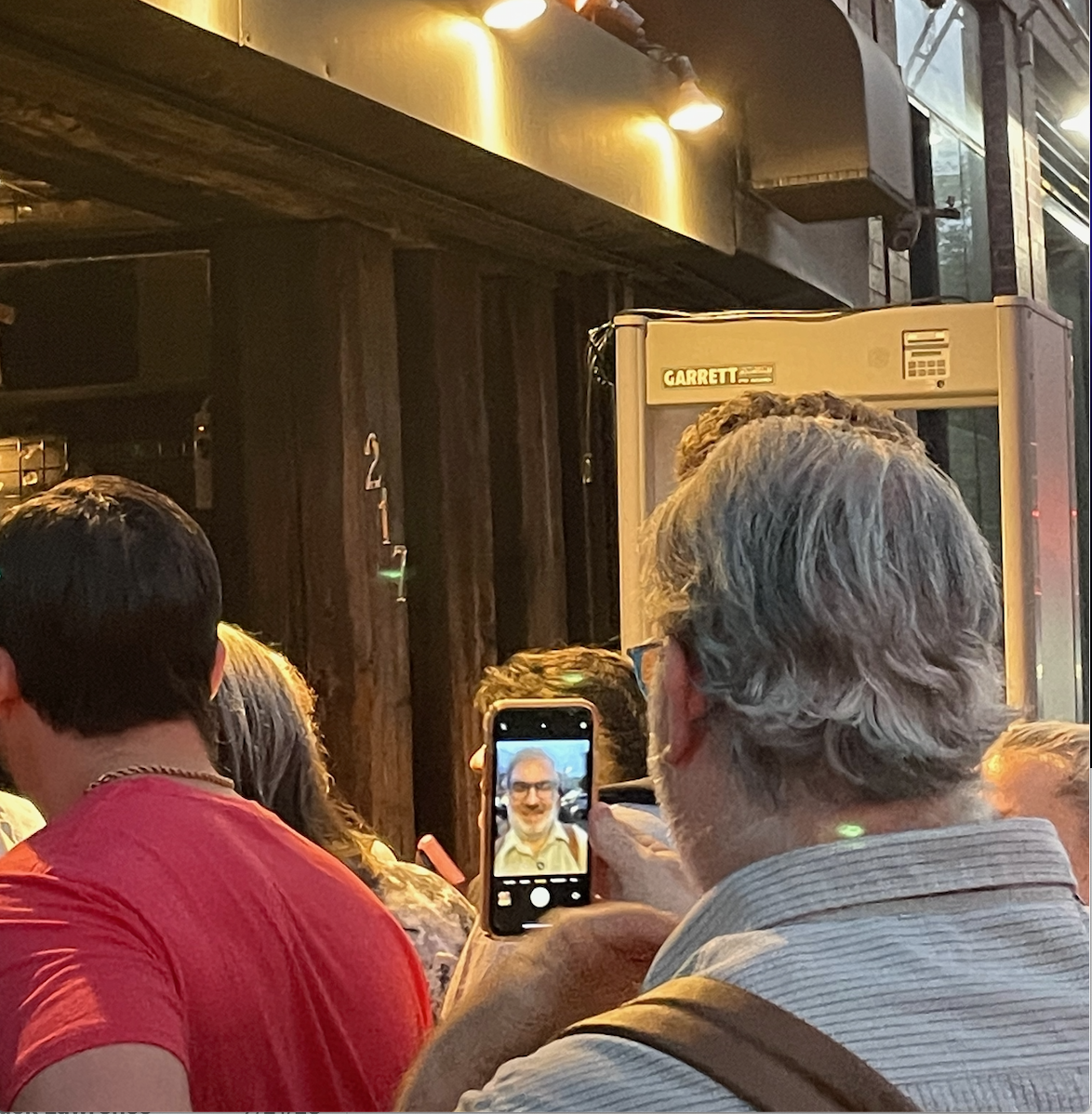middle-aged gyrations; or the version of the self we choose to share
Vastness can exist in words left unsaid.

On stage, Damian Lewis is shaking his hips. Except he isn't, really, because to describe his movements so simplistically is to diminish them. Lewis is twisting, torquing, stress-testing both his pelvic floor and the handiwork of a presumably long-afflicted London tailor while the eager masses bray for more. They cheer and whoop, the men paunchy and flared-jean wearing, the women more beautiful than their dates, and for a moment, it seems no one will be satisfied until physical therapy is prescribed. Lewis indulges, his body extending and retracting with frantic ferocity. A showman puts on a show, insurance premiums be damned. But within his indulgence lives a tinge of impetuousness, as if to emphasize that these contortions originate from somewhere deep within and more pressingly, belong only to him. Each straining muscle seems to be an effort at reclamation. Everyone in the crowd, myself included, is the proud owner of a theory about what precisely is being reclaimed. But if anything was certain on this peculiar Wednesday night, it was this: whether or not Lewis had any answers to our questions was immaterial. He clearly felt under no obligation to share.
You might not know Damian Lewis' name, but you would certainly recognize his face. Long and straight with demarcating lines that carve through the cheeks and across the forehead, something about his countenance imposes structure, authority. It is a beautiful face, a visage so elegant that a higher power seems to have intervened to halt the effects of aging, and it is the kind of face that imbues Lewis with charisma and composure before he utters a single word. But you have already heard Lewis speak, likely many more times than you realize. He has growled at you as King Henry VIII with a paranoid, Eton-educated gruffness in Wolf Hall, commanded you across Nazi-infested territory as Lieutenant-turned-Captain-turned-Major Dick Winters in the inimitable Band of Brothers, made Claire Danes break into face-melting sobs as Sgt. Nicholas Brody in Homeland and so on and so on. Lewis is an actor, an excellent one, and he is seemingly most at ease playing macho American military men, which is one reason why it's particularly jarring when he struts out on stage at 7 PM on the dot, wearing a v-neck contraption that plunges to depths even Stockton Rush would have known to avoid.
Damian Lewis makes music these days, you see, and he dresses like it too. This is all very new. He has acted for thirty years, achieved great fame and accumulated what I presume to be disgusting wealth, but now he's striving to be something and someone altogether different. Lewis is certainly not the first middle-aged man to pray at the altar of reinvention, nor is his pursuit of newfound purpose in a manner so public without precedent, but there is no denying that few have lept from such great heights in periwinkle pants quite as tight.
Cynicism wafts among the crowd in the moments before Lewis clambers gorgeously on stage. Given recent events, this should come as little surprise. Lewis is only a few weeks removed from his pre-race rendition of the British national anthem at Silverstone, a performance that both served as his global stepping-out as a musician and calamitously, inexplicably featured a saxophone. The broadcast included at least one awkward shot of F1 drivers valiantly trying to swallow their laughter, and several more of racegoers not even deigning to try. It is never ideal to find oneself compared to Fergie at the NBA All-Star Game and yet, as the lights dim in the Mercury Lounge, these are the expectations for the man moments away from emergence.
Above all else, a fundamental imbalance simmers in the room. Each swaying body knows much more about Lewis than he knows about us. We, the bizarre collection of New Yorkers willing to venture out to a Damian Lewis weeknight concert, can recite the films he's starred in, the soccer team he supports, how many kids he has, where he went to school, etc. That we've never met is irrelevant: we understand Lewis' psyche, can convince ourselves a shared intimacy exists, and have fixed the Brit in an identity as unshakeable as it is untethered to anything tactile. More precariously, we all know - because we're fans, after all, and when you're a fan, there exists no corner of a celebrity's life to which you are not owed ownership - that Lewis' wife Helen McCrory died just over two years ago after a sustained illness. In return, all Lewis can assert with any solidity is that each of us had planless Wednesdays and $38 to blow.
So please, Damian, if you wouldn't mind: put on a show.
Society imposes a strict framework upon those who have suffered loss. In People Who Eat Darkness, Richard Lloyd Parry's searing account of Lucie Blackman's lurid 2000 disappearance in Japan, Parry writes:
"The families of the missing are doubly burdened: first by the pain of their ordeal, and then by our expectations of them, expectations of a standard of behavior higher than we require of ourselves. As humans, we seek naturally to help fellow creatures in distress. But most of us, whether we are conscious of it or not, expect something back - the flattery of helplessness and of need."
In short, the bereaved are expected to perform, albeit not necessarily with a backing band. The stakes of this performance are unbearably - and unfairly - high, the contours rigid and fixed. Mercy on whoever has the gall to grieve the wrong way. If you are the parent of a missing child and fail to exhibit the requisite inconsolability, you run the risk of being accused of heartlessness or, worse, complicity. If you cannot muster tears at your brother's funeral, say, or find yourself expressing guilty relief at the passing of a long-suffering relative, you will soon hear the murmurings. And if, all of a sudden, you pause a thirty-year acting career to begin recording songs with titles like "Never Judge a Man by his Umbrella," you can expect a crowd hungry to attach motive where none lives, quick to find vestiges of grief hidden under every hastily heard lyric and even quicker to assume ownership. Lewis seems resigned to his powerlessness. When asked in a recent interview whether his music was about McCrory, he answered: “No. People will, you know…they’ll find in the songs what they want to find in them.”
All of this is to say: when Damien Lewis, fledgling troubadour, walks up to the microphone, success is not the most likely outcome. Judgments are already percolating around teeth and tongues, waiting only for the first trickling tear or a hint of Silverstone redux to be sneeringly whispered to one's companions. King Henry VIII's wives faced better odds.
And yet Lewis is genuinely good. Yes, he mishits a note six seconds into his first song, but his voice is gravelly and distinct, and his stage presence drips with the confidence and the swagger of, well, a man accustomed to the stage. He performs a mix of originals and husky Neil Young/J.J. Cale/Warren Zevon covers, punctuating each song break with a charming story or a suave little joke and within minutes, almost as if the roof has been tipped to one side, the place has emptied of irony. This is a cigarette-smoking crowd and when we congregate outside after the show, all together, all waiting for Lewis (who we always believed in, for the record) to emerge, a palpable sense of relief rises alongside the tendrils of smoke.
Four days have passed since Lewis finished his last song and I have found myself thinking about his performance over and over. I cannot know if Lewis spent his time in New York meditating anxiously on the plethora of assumptions awaiting him, whether he paced the green room debating whether to acknowledge his grief or Silverstone or Billions, but I do know that the version of the man on stage, chest hair billowing, made no mention of any. It was a staggering thing, truly, to witness someone in the midst of such overt recalibration, shuddering through the doldrums of immense vulnerability - and for that person to decide that that precariousness belonged to him alone. Save for a quick joke about how old he was to start a new career, Lewis fed no meat to the lions. Instead, he writhed before us in willful subversion of the expectations that he surely knew were held for him, and he felt no need to acknowledge or apologize. A vastness can exist in words left unsaid.

Silence is everywhere these days. The pandemic has come and gone, leaving behind shockingly little in lasting legacy beyond an enormous hollowness. There were 10,000 articles a day in March 2020 about how COVID would alter us and remake society - now, in July of 2023, where is the equal urge to measure how we have been remade? Some people wear masks on planes, many of us work remotely in ways that would have been impossible three years ago but largely, a global trauma was imposed and then lifted with stunningly disproportionate intensity. We do not talk often with each other about how we have changed, although we all have, and I expect that many of us cannot even admit as much to ourselves. It is easier that way, more convenient, and of course, there's a higher likelihood of returning to normalcy, the logic suggests, if you just don't mention the departure. If a vastness existed in Lewis' stoic defiance, a withering smallness inhabits this suffocating repression.
Parry's term, the 'flattery of helplessness' lingers. Lewis refused to be helpless, couldn't bring himself to pander. It manifested in silence of a sort, yes, but there was something very loud about such remarkable self-possession. I wonder if the rest of us have, in turn, convinced ourselves that by burying the anxiety and existentialism and nihilism that has come to color our daily mosaics, we are achieving the same output. We are not. But we flatter ourselves all the same.
Damian Lewis' music can be found here, as well as on Apple Music, Spotify, and presumably many other places.
